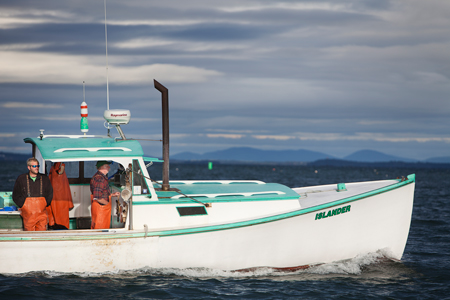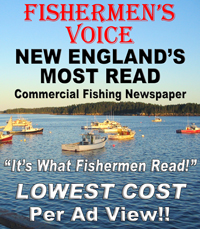
“Off The Point.” The days when just being in it makes the trip worth while. Recent lobster licensing changes may effect the wait time for access for young people who want to fish. Access, in a larger sense, to fisheries resources both commercially and as a local food supply is a concern being addressed on both the East Coast, Gulf of Mexico and West Coast. Driving concern is the top down movement to privatize public marine resources. The impact of catch shares and pending Ocean Policy marine zoning are linked. Peter Ralston photo http://www.ralstongallery.com
Fishermen & Farmers
Meet at Machias
The Future is the Past
by Paul Molyneaux
Two fisheries conferences took place on March 12, 2016—Slow Fish 2016, an international event in New Orleans; and the Washington County Food Summit in East Machias.
Slow Fish hosted fishermen, scientists, regulators and fishery activists from around the world. They gathered to network and share winning strategies for fishermen who have endured in a food production system controlled by large-scale entities that also dominate management and marketing. That meeting included renowned chefs who prepared shrimp, oysters and other delights flown in by fishermen from all over the U.S.
That same weekend, the NGO Healthy Acadia held the second biannual Washington County Food Summit, with a similar agenda. The summit, held at Washington Academy High School, was the kind of localized event the larger Slow Fish conference said it hoped to spawn. The lunch menu had a distinctly Downeast flavor: smoked alewives and an alewife dip made by Dwayne Shaw, director of the Downeast Salmon Federation.
By connecting farmers to fishermen from the coast of Maine, Healthy Acadia was ahead of the curve. “Our mission was to bring fishermen and farmers together to network and share resources and ideas,” said event organizer Regina Grabrovac.
Amanda Beal, of Maine Farmland Trust, delivered the keynote speech, Land and Sea: Connections in Our Food System.






